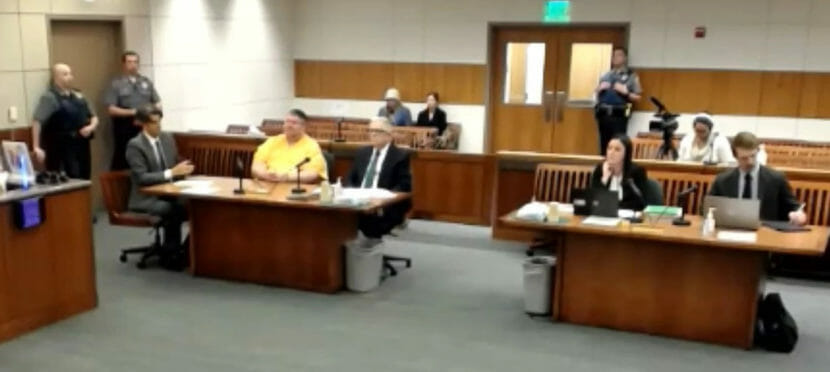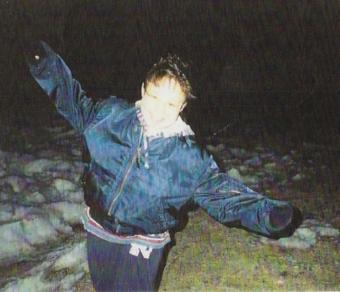
Steven Harris Downs was sentenced yesterday to 75 years in jail for the 1993 rape and murder of Sophie Sergie in a dormitory bathroom at University of Alaska Fairbanks.
The case baffled investigators for decades and became notorious because of the circumstances: a young woman stabbed and shot while she was visiting friends at college in Fairbanks right before finals week that spring. Among the potential hundreds of witnesses in the dormitory complex, no one had enough evidence to give Alaska State Troopers a solid suspect.
In 2018, DNA science provided a breakthrough. A sample on the victim was matched to Downs, who was living in Bartlett Hall that semester, one floor up from where the victim was found.
“The murder and rape took place in a woman’s restroom on the UAF campus in the woman’s floor of a dormitory, and the women’s restroom is an area where women are likely at their most vulnerable, but this is the location Mr. Downs chose to invade and commit his crimes,” said Superior Court Judge Thomas Temple.
Temple presided over the trial last January and listened Monday to pre-sentence reports from prosecutor Jenna Gruenstien and Defense attorney James Howaniec.
Gruenstein asked the judge to consider factors to influence a longer sentence: the use of multiple weapons in the crime, both a knife and a gun, as well as using a murder to prevent the reporting of a sexual assault.
“Whether they’re aggravators by analogy, or just factors that the court considers and places weight on (for) implementing the appropriate sentence — so in this case, the court has very wide discretion in the murder in the first degree sentence, 20 to 99 years to impose,” she said.
The judge said he would use the 1993 sentencing guidelines.
“To the charge of sexual assault in the first degree, the court is required by law to impose exactly an eight-year term of incarceration, and the court has no discretion to deviate from that number according to the laws in effect in 1993,” Temple said.
Defense attorney Howaniec asked the judge to consider Downs’ health and approach sentencing from a more “practical” approach.
“I’ll be honest, Judge. The way we’ve approached this is really more on a practical plane. Steve is 48 years old now. He’s over 400 pounds. He’s got very high blood pressure. I think that his life expectancy is not gonna be, you know, 103 years old here. Anything in excess of a 20-year sentence, that’s gonna be bringing him to near the end of his life under the best of circumstances,” Howaniec said.
Downs attended University of Alaska Fairbanks from 1992 to 1996. He lived in Arizona for a while and returned to his home state of Maine. Both the state and the defense noted Downs had no criminal record before, and had no known criminal activity since.
“We asked the court to consider the intervening nearly 30 years. He’s been nothing but a model citizen. He became a nurse, one who cared for hundreds if not thousands of patients. He’s really been a model prisoner at the Fairbanks Correctional Center. He’s helped his fellow prisoners there with everything from their GEDs to help helping to counsel them if they’re dealing with depression or substance abuse issues. He was on the Dean’s List multiple semesters for the remainder of his four years at UAF and then went on to be successful, without a criminal history for the next 30 years,” Howaniec said.
The victim’s brother, Alexi Sergie, was on the phone from Western Alaska before Monday’s hearing began, but the call was dropped before he could testify about the effects his sister’s death had on his family. He did not rejoin the hearing, even after a recess. Friends of the victim were ready to testify, but Judge Temple said it was not appropriate for this hearing.
“I will note that there’s no sentence this court could impose that there be adequate restoration to Ms. Sergie’s surviving family or her extended support network. There’s nothing the court could do to restore those folks,” Temple said.
Steven Downs, himself, did not say anything at the hearing. Howaniec says Downs maintains that he is innocent of the crimes.
“With regard to murder in the first degree, the court imposes a sentence of 67 years. Time to serve court is imposing the eight years of time for the sexual assault consecutive to the 67 years for murder in the first degree. The composite sentence is going to be 75 years,” Temple said.
Under Alaska law, Downs could be released after he serves one-third of his sentence, or 25 years.



